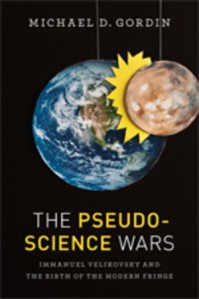The University y of Chicago gives away free e-books. Every month there’s a new one, and they’re all swell. This month’s freebie, I think, is one that folks who follow my blog may really like: The Pseudoscience Wars: Immanuel Velikovsky and the Birth of the Modern Fringe by Michael B. Gordin.
y of Chicago gives away free e-books. Every month there’s a new one, and they’re all swell. This month’s freebie, I think, is one that folks who follow my blog may really like: The Pseudoscience Wars: Immanuel Velikovsky and the Birth of the Modern Fringe by Michael B. Gordin.
I remember reading Velikovsky back when I was in fourth or fifth grade. My dad had copies of Ages in Chaos, Earth in Upheaval (both in paperback) and Worlds in Collision (in hardcover). I loved those books. They were Grand Theories of Everything, in engaging prose, and filled with footnotes to obscure sources. Then something occurred to me: “Hey, wait a minute,” I said to myself. “This guy literally can’t tell the difference between a carbohydrate and a hydrocarbon.” (I had a chemistry set and I knew how to use it. Yes, I was the sort of kid who made molecular models. As we used to say in New York, Ya got a problem wid dat?)
In later life I learned that “nonfiction” is just a publishing category, not a promise by the publisher that everything (or, indeed, anything) in the book is true. Or, later still, that the difference between fiction and nonfiction is that fiction writers tell their own lies.
The realization about Velikovsky came to help me later on when the books by Mark Lane et al. came out; the master questions being What do we know, and How do we know it?
To the book at hand: Gordin quite rightly begins by noting that no one thinks of themself as a pseudoscientist. They think of themselves as scientists. He also notes that scientists don’t call everything they don’t like or don’t agree with as “pseudoscience.” There’s lots of bad science out there — little of it is labeled a pseudoscience.
Then we go on to a grand theory of everything, in engaging prose and with footnotes to obscure sources, linking the publication of Worlds in Collision and its reception to the Red Scare and Joe McCarthy. McCarthyism then gets blended with Lysenkoism, Freudianism, Reichism*, and Creationism. Velikovsky and his influence continue on to the Vietnam War and the — how shall we say this? — worldviews in collision? society in upheaval? age groups in chaos? — of the late 1960s and early 1970s.
Gordin doesn’t go the next step, to link all of the above to the antivax movement and climate change denialism, but if we accept the rest of his argument, that step is inevitable.
Anyway, good book. Red Mike says check it out. (And hey, it’s free….)
- Doyle and I visited the Reich house in
StrangelyRangeley, Maine — it isn’t too far from where we live — where I discovered that, like my parents, Dr. Reich had subscribed to the Book of the Month Club. The volumes in his library were all oddly familiar to me from the books on the shelves at my childhood home.

Reblogged this on Dr. Doyle's Blog and commented:
Over at Jim Macdonald’s blog, there’s a book review that y’all might find interesting.
Other favorite books of my youth included the complete works of Charles Fort, the complete works of Daniel P. Mannix, Chaplin’s Rumor, Fear, and the Madness of Crowds, and a Dover book on Hoaxes.
(I didn’t run into Sabine Baring-Gould’s Curious Myths of the Middle Ages or The Golden Legend until later.)
Gordin doesn’t go the next step, to link all of the above to the antivax movement and climate change denialism, but if we accept the rest of his argument, that step is inevitable.
Are we saying that the author may have spent a bit too much time staring into the abyss himself?
I think this is an older book, and the author may have completed his work before antivax and climate denialism were things.
Or, at some point he had to say, “Enough! I cannot address all the madness in the world!” and shipped it.
Or maybe the deadline arrived.